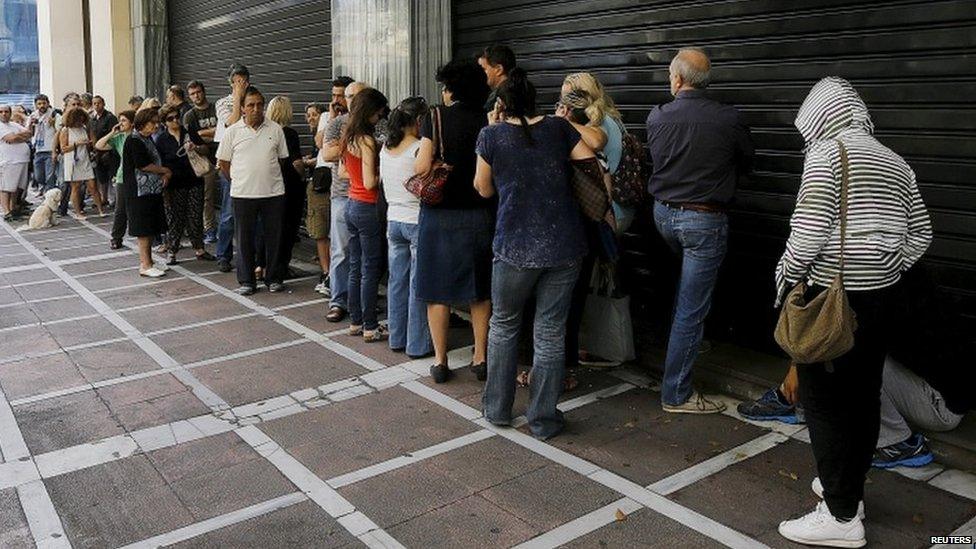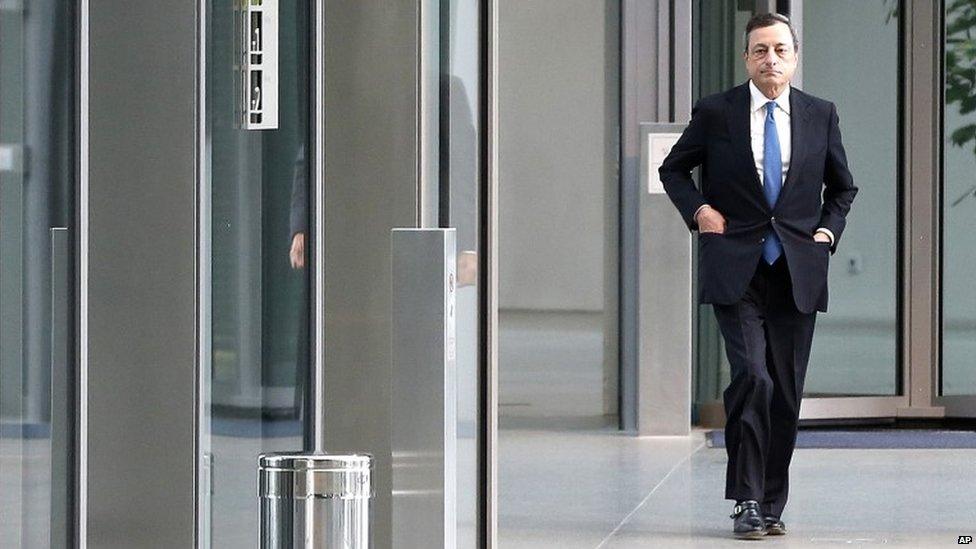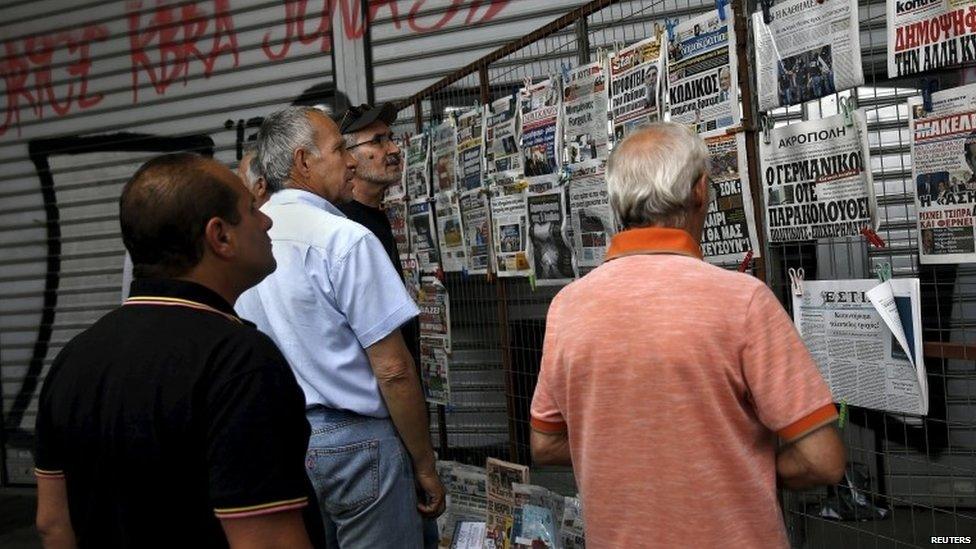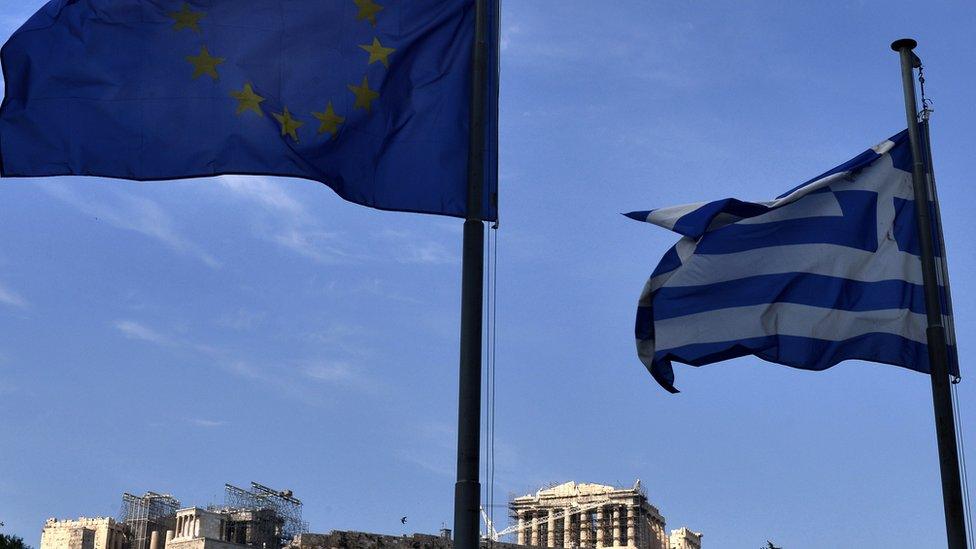Greek debt crisis: ECB faces monumental decisions
- Published
- comments

Customers queued for cash in Athens on Saturday outside a bank branch whose doors remained shut
The European Central Bank faces what is arguably the most challenging and important decision of its relatively short existence this weekend.
Will it continue funding Greek banks next week, in the uncertain days before next weekend's referendum on the bailout deal demanded by the country's major creditors?
Why is this decision so hard? And why does it matter?
It matters, because Greek banks are wholly reliant on support from the ECB - which is provided via the Bank of Greece - and they would fall over without it.
The decision is hard, because some members of the ECB's governing council will fear that it would be breaking all central banking rules by continuing to provide support.
On the one hand, it is now almost inevitable that Greece will miss the 30 June deadline for making a €1.5bn ($1.7bn; £1.06bn) payment to the International Monetary Fund, and that would call into question the solvency of the government.
Also, the existing bailout programme will have expired by then.
So there would be greater doubts (if any were needed) about the solvency of Greek banks, since the Greek state is the ultimate guarantor of the banks and they own so much Greek sovereign debt.
The point is that a central bank is never supposed to lend to insolvent banks, because to do so would be to explicitly throw good money after bad - and would imply the central bank could be failing in its primary responsibility of preserving the value and integrity of the currency.

European Central Bank head Mario Draghi has to decide whether to continue propping up Greek banks
And there is another point. A central bank is only supposed to provide emergency lending to banks in return for collateral, or assets, to cover the value of the vital loans.
But if the pace of withdrawals from Greek banks accelerates in the coming days, as a result of uncertainty created by the referendum on whether the bailout will happen, then those banks could run out of collateral.
So the European Central Bank, operating through the Bank of Greece, would in theory be prohibited under its own rules from continuing to provide Emergency Liquidity Assistance - the name for the life-or-death support provided by the ECB - to the banks.
So normal central banking lore would suggest that the ECB would tell the Greek government that it cannot support the banks in the way that it has been doing.
Remember that it and the Bank of Greece have already provided around €120bn of loans to the banks, to replace the deposits they've lost. And there is a risk of very significant losses on these loans if Greece were to reject the bailout deal and career towards exit from the euro.
That said, officials and bankers tell me that the last thing the ECB wants to be seen to be doing is cause total financial and economic mayhem in Greece - which would be the consequence of any statement this weekend that it is curtailing support for Greek banks.
"The ECB cannot be seen to be an agent of economic collapse in Greece," one source close to the ECB told me.
"It will bend over backwards to see if they can find a way to support the banks through the uncertain days before the poll."

Decisions taken over the next few days will have profound consequences for Greeks
Much hinges, therefore, on any statement later today from the Eurogroup of finance ministers, after their scheduled meeting.
If they give a welcome to Alexis Tsipras's referendum plan, and urge the Greek people to vote for the bailout, if they extend for a few days the current bailout programme for the country, then the ECB will, I am told, do what it can to reassure Greek depositors that they will have continued access to their cash.
But whether the Eurogroup can give an enthusiastic endorsement to the plebiscite is moot - because Alexis Tsipras was last night so emotionally antagonistic to the imposed bailout terms, and because Mr Tsipras has timed the poll in such a way that the country looks set to miss its IMF payment.
Because of the fragility of Greek banks, this is the most important weekend in the eurozone's 16-year life.
Financial decisions will be taken, by eurozone finance ministers and the European Central Bank, that will have profound social and political consequences - mainly for Greece, but also for the whole European monetary project.
- Published27 June 2015
